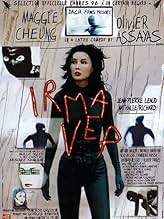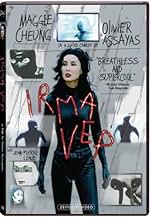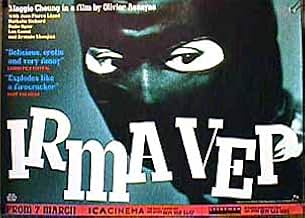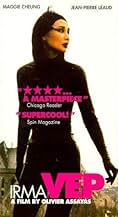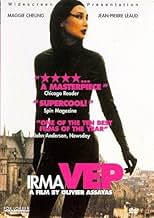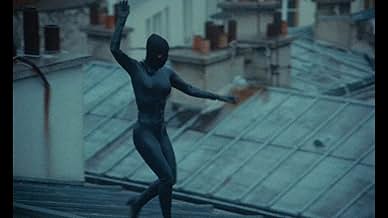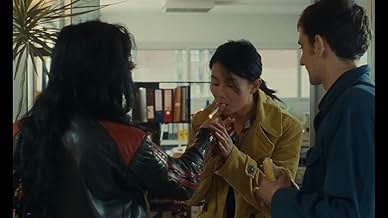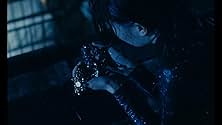A has-been French filmmaker wants a Hong Kong actress to be the heroine in a rendering of Les Vampires.A has-been French filmmaker wants a Hong Kong actress to be the heroine in a rendering of Les Vampires.A has-been French filmmaker wants a Hong Kong actress to be the heroine in a rendering of Les Vampires.
- Awards
- 2 wins & 4 nominations total
- Director
- Writer
- All cast & crew
- Production, box office & more at IMDbPro
7.010.5K
1
2
3
4
5
6
7
8
9
10
Featured reviews
Palatable, but the best things about it is Maggie
Pretty much average. Except for Maggie. The movie tries to tell us of the pretensions that the French movies have but falls its self prey to the illness that the script attributes to French cinema: boringness and a desire to intellectualism. I don't think the movie really achieves in making its point. If anything, it doesn't have the wide appeal that it says French movies should have. On the other hand, the movie isn't all that bad. In fact, Maggie looks absolutely fabulous, having a natural look that she doesn't have in HK movies, and she seems to revel in the very realistic banter that goes on between her costume designer and herself.
Did I mention that Maggie looks fabulous?
Did I mention that Maggie looks fabulous?
If They Finish A Movie, It's A Miracle
French director Jean-Pierre Léaud decides to remake Feuillade's silent serial LES VAMPIRES as a modern feature. He decides to cast Maggie Cheung as Irma Vep based on seeing her in one movie in Marrakesh. When the movie opens, Miss Cheung has just arrived at Léaud's office in the last throes of pre-production, whence she is whisked away to a sex shop to buy a gimp suit to be modified for her costume. After that, things become chaotic, with spoiled takes, spoiled tempers and journalists who lecture her on how to make films.
Miss Cheung is wonderful in the role, a sweet-faced, slightly puzzled woman stranded alone in Paris, trying to perform her part in her first international production, while chaos swirls about her.
There is a lovely, impromptu feel about Olivier Assayas' movie. It feels as if he started out trying to do the remake, and as that became impossible, switched to a different film. That seems unlikely. Undoubtedly that was the look and feel he was trying for. The result is an amusing, slightly tentative effort that makes me wish to look at LES VAMPIRES again.
Miss Cheung is wonderful in the role, a sweet-faced, slightly puzzled woman stranded alone in Paris, trying to perform her part in her first international production, while chaos swirls about her.
There is a lovely, impromptu feel about Olivier Assayas' movie. It feels as if he started out trying to do the remake, and as that became impossible, switched to a different film. That seems unlikely. Undoubtedly that was the look and feel he was trying for. The result is an amusing, slightly tentative effort that makes me wish to look at LES VAMPIRES again.
Surprisingly entertaining
I just watched Irma Vep last night. And I have to say that I enjoyed watching this movie for many reasons. Evidently Maggie is one of the reasons. Beautiful of course and good actress to boot. But beyond that, we have a lot of other things that kept my interest alive all along. This movie presents a self examination of French movie making, thereby justifying the accusation of "nombrilisme" (narcissism) by the reporter interviewing Maggy. This seems to be one of the themes here. A close look at the movie making process in France where a certain lack of coordination seems to be the rule, where a director launches the movie making only based on a whim. And in this case, it's the idea of having Maggie Cheung play the main role of a character in a remake of a 1915 silent movie. What really becomes interesting is the way she gets into the role and really becomes Irma. But I will leave you to discover how and when. At any rate, the movie has the funny effect to make you wonder if French movie making is in that bad a state that it can come up with such an interesting product.
Painful
This truly is a film for film elites. I really enjoy films about human relationships and films about social injustice. I don't enjoy uber-intellectual movies that discuss film-making in a way that can be understood by only a limited number of folks who are keyed into interpretions of art house films. This is not a film for a wide audience, though at best it makes the uninitiated curious. Overall, films made for a select few should be available to the select few only. The rest of us who stumble on it at our local video store sit for a painful 96 minutes waiting for the plot and story to congeal enough for us to understand what the heck it's all about. We come out empty-handed in the end. It is a waste and it isn't. I know what people are bitching about with regards to intellectual French films, but then again, I'm not sure if I really care.
A well-constructed, pleasant surprise.
Maggie Cheung or not, I didn't expect much out of this film. But I was quite pleasantly surprised by how much I enjoyed it. For one, to get someone to play themselves in a lead role in a fictional film (Jackie Chan films and Roy Rogers aside;) is usually a risky thing to do. But Cheung fits in beautifully, and is so charming that she is obviously perfectly cast.
The film is in English and French, and even though the French is subtitled, I think it's easier to get caught up in the flow of the film if you understand both (I'm fluent in French and didn't have a problem, but I can see where it might be overly distracting). Some scenes seemed particularly important for one to be constantly looking away from the action, so to speak.
The film was a little long, and some scenes probably could have been cut down or cut altogether, but it gives a good view into French film-making, especially the snobbish elitism that is apparently common in more intellectual/artistic film circles. It's hysterically funny at some points, and the characterization of the different crew members is brilliantly portrayed.
I especially loved the scene where Maggie Cheung gets into characters by actually prowling around as a cat burglar (though she throws away her booty;)
Overall: a tight, well done film. It drags just a bit at points, but strong acting and strong writing help to overcome such lags. A pleasant surprise and a fun film! 8/10.
The film is in English and French, and even though the French is subtitled, I think it's easier to get caught up in the flow of the film if you understand both (I'm fluent in French and didn't have a problem, but I can see where it might be overly distracting). Some scenes seemed particularly important for one to be constantly looking away from the action, so to speak.
The film was a little long, and some scenes probably could have been cut down or cut altogether, but it gives a good view into French film-making, especially the snobbish elitism that is apparently common in more intellectual/artistic film circles. It's hysterically funny at some points, and the characterization of the different crew members is brilliantly portrayed.
I especially loved the scene where Maggie Cheung gets into characters by actually prowling around as a cat burglar (though she throws away her booty;)
Overall: a tight, well done film. It drags just a bit at points, but strong acting and strong writing help to overcome such lags. A pleasant surprise and a fun film! 8/10.
Did you know
- TriviaMuch of the film depicts set-related incidents that echo scenes in François Truffaut's Day for Night (1973), to which Irma Vep owes a large thematic debt. However, Olivier Assayas publicly stated that although he considers Day for Night (1973) a great film, it is more about the fantasy of filmmaking than the reality. Assayas credits Rainer Werner Fassbinder's Beware of a Holy Whore (1971) as a greater inspiration.
- GoofsAfter René says, "respect the silence" to Maggie, he speaks to a woman and takes a drink from a big plastic Coke bottle. He screws the cap on, then hands her the bottle. She turns around, and the cap is missing.
- ConnectionsFeatured in Seventh Heaven (1997)
- How long is Irma Vep?Powered by Alexa
Details
Box office
- Gross US & Canada
- $282,310
- Opening weekend US & Canada
- $11,852
- May 4, 1997
- Gross worldwide
- $315,015
- Runtime
- 1h 39m(99 min)
- Color
- Sound mix
- Aspect ratio
- 1.66 : 1
Contribute to this page
Suggest an edit or add missing content


